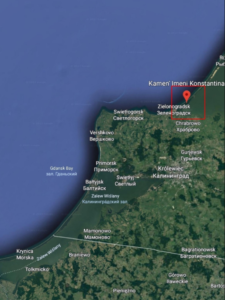A campaign of disinformation is taking place and it has already hit the Polish natural gas and oil industry and the future of the nuclear sector. Lithuania has designed solutions that may help to protect against such operations. Despite that, Poland is not cooperating on the issue yet – writes Wojciech Jakóbik, BiznesAlert.pl’s editor in chief.
Russia’s Defense Minister Sergey Shoygu acknowledged that information has become „yet another kind of weapon, another element of the Military Forces.” Lithuania’s Ministry of Defense officially recognized that information operations against the energy sector are one of the tools used by Russia to destabilize the situation in Europe.
Western states, including Poland and Lithuania, are the target of such operations. Their goal is to convince western societies that there is no point in fighting against the dependence on Russian raw materials. It is a form of a policing operation of the energy sector. The transmission channels include the Russian political elite, Russian television as well as the new media, including popular websites financed by Moscow such as regnum.ru and rubaltic.ru. They have a significant impact in the Baltic States where large Russian minorities live and use the so-called Runet, which is the Russian-speaking news space in the Internet. In the opinion of Lithuania’s Ministry of Defense Russian information operations encompass social media and YouTube. They are conducted during conferences, cultural events, they crop up in games and appearances of people who have an impact on the public opinion.
According to the Lithuanian ministry, the Russia Today channel currently has 22 broadcast satellites, over 230 transmitter operators. It attracts 644 million viewers from over 100 countries. It is available in three million hotel rooms across the world and its budget is USD 400 million (2015). It broadcasts in English, Arabic, Spanish, German, French and Russian. It has more YouTube videos that any other press agency in the world. The Russian Sputnik is a multimedia platform with its own Internet portal, a news webpage and presence in the social media, it also has information hubs created to spread its content. It is available in 30 languages and 34 states and 130 cities. It broadcasts about 800 radio hours a day. Russians are also opening news channels in Russian. Lithuanians have been monitoring the ever-increasing presence of these developments. In 2007 it was 79 hours a week, in 2016 – 151 and 2017 – as many as 198.
Information campaigns use the so-called troll factory that has been written about in the Western media extensively. In Petersburg there are fulltime commentators whose job is to influence the discussion in the Internet. The level of their activity is correlated with international events that are important for Russia, such as the current Zapad 2017 military drills. They produce fake news, such as the fake statement made by Lithuania’s Defense Minister who supposedly said, while the Alliance was working on creating the Eastern Flank, that NATO did not ensure security and was a threat. This statement spread across the Russian-speaking Internet in Lithuania and then found its way to the social media and became a legend repeated in the public debate. At the same time Russians do their best to silence true information. Lithuania’s Defense Ministry reported about hacker attacks which blocked the attempts at denying fake news produced by Russian disinformation campaigns, for instance through blocking internet portals of the institutions involved.
In a conversation with BiznesAlert.pl anonymous representatives of Lithuania’s Defense Ministry said the discussion on breaking free of the dependence on Russian resources has also been targeted by Russia’s information operation. The ministry believes the Russians want to convince the West that it is more beneficial to buy more from them, than pay for diversification projects, such as the LNG terminal in Klaipeda. Thanks to these operations the economic arguments promoted by Russia Today and Sputnik that disregard other economic and political counterarguments are finding their way to the Lithuanian media.
I think that a parallel mechanism is present in the Polish media. This is exemplified by the myth about cheap gas from Russia, which I have previously written about. I also wrote about the disinformation campaign surrounding nuclear energy started right before Poland’s decision on whether to construct a nuclear power plant. Additionally, Russia’s actions for instance in the case of the controversial Nord Stream 2 project, criticized by Poland and Lithuania, are causing rifts in Europe.
The Lithuanian ministry created a classification on how European countries perceived these arguments. The first group includes the principled defenders. such as Poland and Lithuania. Those countries are afraid of what Russians are doing and are encouraging a determined response from the EU. The awakened are the second group. It includes states that changed their approach to Russia after the aggression on Ukraine, it encompasses Sweden and Germany. The third group secretly supports Russia and includes Croatia, Romania and Bulgaria. Those states are afraid of what Russians might do, but because of their history and local situation are refraining from explicit criticism. The next group includes states that are isolating themselves from the problem, such as Austria, Belgium and Spain. They do not want to get involved in the discussion on Russia because they do not have any ties with Moscow and do not share the feeling of insecurity. Whereas Slovakia and Hungary were classified as states that use the Russian card in national politics. They use positive messages about their relations with Russia to political and economic ends inside the country, but also as a leverage in their relations with the administration in Brussels, which is exemplified by Victor Orban. The final group constitutes the Kremlin’s friends. The group encompasses Cyprus, Greece and Italy. Those countries do not feel threatened by Russia, they support its foreign policy and take action to block decisive steps against Russia’s policies, e.g. they are for lifting the western sanctions. This is how Russia is causing rifts in the European Union and is making it impossible to forcefully react to, at least, the disposable idea (according to the European Commission), of Nord Stream 2.
In order to diagnose information operations, Lithuanians created a special computer program that has a timeline with Russia’s disinformation activities. It reveals the increase in activities and allows to design an adequate response in the media. This patent has been used in Great Britain among others, about which the ministry’s representatives boasted. These solutions are used by NATO’s Energy Security Centre of Excellence in Vilnius in whose work Poland, contrary to Great Britain, is not participating. It is also worth to engage in Tallinn’s NATO Cyber Security Centre for Excellence. The demand for protection against disinformation is evidenced by the bottom-up initiative of the 'elf’ factory. Elves are fictional creatures that in the fantasy mythology and literature are mortal enemies of trolls, and more than often allies of humans. A Lithuanian group established by activists bases its work on this principle. Its goal is to expose fake social media accounts. Similar endeavors like „Stop Fake” in Ukraine or „Russian 5th Column in Poland” are multiplying in Europe. However, they lack the scale that could be provided by government institutions. „Elves” that would be working on the international level (e.g. as part of NATO) could ensure a more efficient defensive umbrella in the information sphere.
It is worth to engage Poland in multilateral attempts at fighting against information operations because it would allow us to exchange experiences and because Russia is relentlessly pursuing a disinformation campaign in Poland. One evidence of this is the situation when the Polish Minister of Defense spread false information that despite sanctions the French Mistral helicopters will be resold via Egypt to Russia for a symbolic dollar. Since efforts to limit Poland’s dependence on Russian raw materials have been undertaken by, among others, PGNiG, PKN Orlen and Grupa Lotos, we need those companies to be protected. The same pertains to Poland’s nuclear project, provided that a decision to pursue it will be made. The Ministry of Energy does not have the power necessary to implement these kinds of measures, whereas the Ministry of Defense has a wide array of possibilities to choose from, including cooperation with our Baltic neighbors. The Polish energy industry needs „elves” to fight with disinformation.








